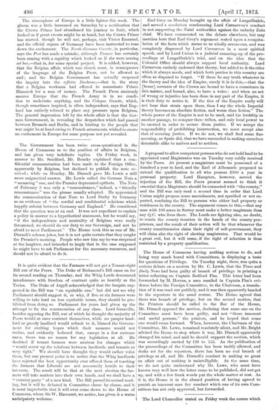The House of Commons having nothing serious to do, and
being very much bored with Committees, is displaying a taste for questions of Privilege. On Tuesday night, there was quite a- serious debate on a motion by Mr. C. Lewis, that the Times and Daily News had been guilty of breach of privilege in printing a. letter reflecting on Captain Bedford Pim. This letter had been forwarded by M. Herron, a man assailed in Captain Pim's evi- dence before the Foreign Committee, to the Chairman, a transla- tion of it was read out publicly, and it was then apparently handed to the reporters in the usual course. The House agreed that there was breach of privilege, but on the second motion, that the Printers should be called to the Bar of the House, Mr. Disraeli opposed the motion, declaring that some one on the Committee must have been guilty, and not "those innocent and useful persons," the printers, and he hoped that some one would come forward. When, however, the Chairman of the Committee, Mr. Lowe, remained resolutely silent, and Mr. Bright advised the House to stop where it was, Mr. Disraeli apparently changed his mind, and said he should support the motion, which was accordingly carried by 199 to 155. As the publication of the proceedings of the Committee has been tacitly allowed, and desks set for the reporters, there has been no real breach of privilege at all, and Mr. Disraeli's conduct in making so great - an affair out of nothing is unintelligible. At the same time, we do not quite understand why Mr. Lowe, who must have known very well how the letter came to be published, did not get up, and with a few frank words put the whole matter at rest. As it is, the House is in the absurd position of having agreed to punish an innocent man for conduct which one of its own Com- mittees has not only approved, but forwarded.


































 Previous page
Previous page